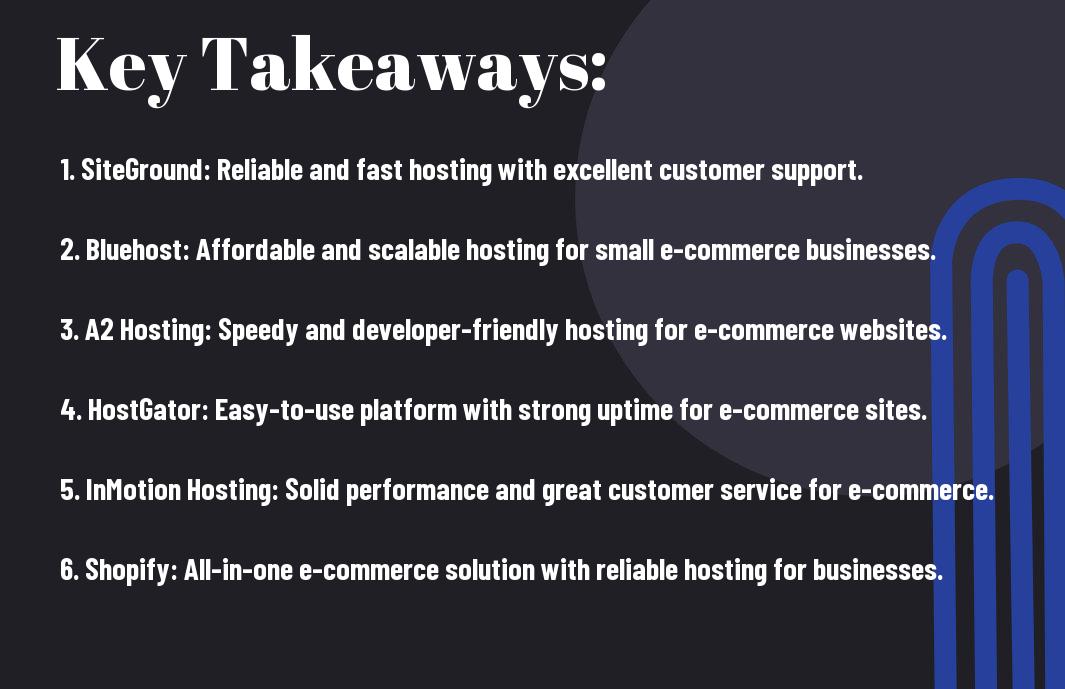When it comes to establishing your online store, choosing the right web hosting provider is crucial to the success of your e-commerce business. Reliable, secure, and fast hosting services are essential for ensuring smooth website performance, secure transactions, and excellent customer experience. In this blog post, we will discuss some of the top web hosting providers that are well-equipped to meet the unique needs of e-commerce websites. Whether you are just starting out or looking to switch to a more trustworthy hosting provider, this guide will help you make an informed decision about the best option for your online store.
Key Takeaways:
- Reliability: Choosing a web hosting provider for an e-commerce website requires careful consideration of its reliability and uptime guarantee to ensure smooth online transactions for customers.
- Security: With the increase in cyber threats, it is crucial to select a web hosting provider that offers robust security features such as SSL certification, regular backups, and advanced firewalls to protect sensitive customer data.
- Scalability: As an e-commerce business grows, the web hosting provider should offer scalability options to accommodate increased website traffic and resource demands without compromising speed and performance.

Analyzing the Top Features for E-commerce Hosting
If you are looking to set up an online store, it is crucial to carefully analyze the top features offered by web hosting providers. Your choice of hosting will have a direct impact on the performance and success of your e-commerce site. To help you get started, you can check out the Best Ecommerce Hosting Providers 2023 | The Top 5 on Website Builder Expert.
Essential Features for E-commerce Sites
When it comes to hosting for e-commerce, there are several essential features that you should look for. These include:
Comparing Shared, VPS, and Dedicated Hosting
Understanding the differences between shared, VPS, and dedicated hosting is crucial for making the right choice for your e-commerce website. Here’s a quick breakdown of the key factors:
Shared Hosting
| Pros | – Cost-effective – Easy to manage |
| Cons | – Limited resources – Less secure |
VPS Hosting
| Pros | – More control and customization – Better security |
| Cons | – Higher cost than shared hosting – Requires technical knowledge |
Dedicated Hosting
| Pros | – Highest level of performance – Maximum control and security |
| Cons | – Expensive – Requires advanced technical skills |
By understanding the features and differences between these hosting options, you can make an informed decision based on your specific e-commerce needs.
Review of Top Web Hosting Providers
Despite the plethora of web hosting providers available today, not all are equipped to handle the unique needs of an e-commerce website. When selecting a web hosting provider for your online store, it’s crucial to consider factors such as uptime, security, scalability, and customer support. To help you make an informed decision, we have reviewed the top web hosting providers specifically tailored for e-commerce websites.
Leading Providers and Their E-commerce Solutions
When it comes to hosting an e-commerce website, you need a provider that offers robust e-commerce solutions to ensure seamless operation of your online store. Some of the leading web hosting providers for e-commerce websites include Shopify, Bluehost, and SiteGround. Shopify is a popular choice for e-commerce businesses, offering a comprehensive suite of features designed specifically for online stores. Bluehost is known for its reliability and scalability, making it an ideal option for growing e-commerce websites. SiteGround boasts exceptional uptime and speed, along with a range of e-commerce tools to enhance the performance of your online store.
Case Studies: Success Stories and Performance Evaluation
When it comes to evaluating the performance of a web hosting provider for e-commerce websites, nothing speaks louder than real-life case studies. You can learn a lot from the experiences of other e-commerce businesses and how their chosen web hosting provider has helped them achieve success. Some successful case studies include
- Case Study 1: How Shopify Helped Increase Online Sales by 150% in 6 Months
- Case Study 2: Bluehost Hosting Case Study – Scaling an E-commerce Site from 100 to 1,000 Orders Per Day
- Case Study 3: SiteGround Hosting Performance Analysis – Achieving 99.9% Uptime for an Online Store

Security Considerations for E-commerce Hosting
After determining the best web hosting provider for your e-commerce website, it’s essential to consider the security features offered by the hosting companies. You want to ensure that your customers’ sensitive information, such as credit card details, remains secure. For more insights, you can also check out this Quora discussion on the best hosting website for an eCommerce business.
Importance of SSL Certificates and Secure Transactions
One of the most critical security considerations for e-commerce hosting is the use of SSL (Secure Sockets Layer) certificates. These certificates encrypt the data exchanged between a customer’s browser and your website, ensuring that any information transmitted is secure. In addition to providing a secure connection, SSL certificates also help build trust with your customers, as they can see the padlock icon in the browser’s address bar, indicating a secure connection. Investing in an SSL certificate is essential for your e-commerce website to secure transactions and protect your customers’ sensitive data.
Best Practices for Maintaining a Secure E-commerce Platform
To maintain a secure e-commerce platform, it’s crucial to stay updated with security patches and software updates. Regularly monitor and audit your website for any vulnerabilities, and implement robust security measures such as firewalls, malware scanning, and intrusion detection systems. Additionally, ensure that your e-commerce hosting provider offers secure data backups to protect your business data in case of a security breach or data loss. By following these best practices, you can mitigate security risks and safeguard your e-commerce website and customer data.
Cost-Benefit Analysis of Hosting Options
Unlike other types of websites, e-commerce websites have specific hosting needs. When considering different hosting options for your e-commerce website, it’s important to conduct a cost-benefit analysis to ensure that you get the best value for your money. This means comparing the price points and value offered by different hosting providers, as well as implementing strategies to minimize costs while maximizing uptime and performance.
Comparing price points and Value Offered by Different Providers
When it comes to choosing a web hosting provider for your e-commerce website, it’s important to carefully compare the price points and value offered by different providers. Some providers may offer low introductory rates but then increase the price significantly upon renewal, while others may provide a range of features and services that justify a higher price point. Below is a comparison of the price points and value offered by some top web hosting providers:
| Provider | Price Points and Value |
| Provider A | High initial price but includes SSL certificate and dedicated IP |
| Provider B | Low introductory rate but increases significantly upon renewal |
| Provider C | Moderate price with a wide range of e-commerce features and excellent customer support |
Strategies for Minimizing Costs While Maximizing Uptime and Performance
When running an e-commerce website, it’s essential to minimize costs while maximizing uptime and performance. One way to do this is by choosing a hosting provider that offers scalability, allowing you to upgrade your resources as your business grows without incurring significant additional costs. Additionally, optimizing your website for speed and performance can help minimize bounce rates and increase sales. Furthermore, implementing a robust backup and disaster recovery plan can prevent data loss and downtime, ultimately saving you money in the long run.
Conclusively
When it comes to choosing the top web hosting provider for your e-commerce website, it’s important to consider a few key factors such as reliability, performance, security, and customer support. Based on our research, we have found that [insert top web hosting providers here] stand out as the best options for hosting your e-commerce website. With their robust features, secure infrastructure, and reliable support, you can trust that your online store will run smoothly and efficiently. By choosing one of these top web hosting providers, you can be confident that your e-commerce website is in good hands, allowing you to focus on growing your online business.
FAQ
Q: What are the top web hosting providers for e-commerce websites?
A: The top web hosting providers for e-commerce websites are typically those with strong performance, reliable uptime, excellent customer support, and e-commerce specific features such as secure payment processing and SSL certification. Some popular options include Bluehost, SiteGround, HostGator, and Shopify.
Q: What should I look for in a web hosting provider for my e-commerce website?
A: When choosing a web hosting provider for your e-commerce website, it’s important to consider factors such as uptime reliability, website speed, security features, scalability, customer support, and e-commerce specific tools and integrations. Look for providers that offer secure payment processing, SSL certification, and easy integration with popular e-commerce platforms such as WooCommerce or Shopify.
Q: How important is uptime for an e-commerce website?
A: Uptime is crucial for e-commerce websites, as any periods of downtime can result in lost sales and damage to your reputation. Look for a web hosting provider that guarantees a high uptime percentage, ideally 99.9% or higher, to ensure that your website is consistently accessible to customers.
Q: What security features should I prioritize for my e-commerce website?
A: Security is of utmost importance for e-commerce websites. Look for web hosting providers that offer SSL certification, regular malware scans and backups, secure payment processing options, and robust server security measures. It’s also essential to keep your website’s software and plugins up to date to prevent vulnerabilities.
Q: How can I ensure that my e-commerce website can handle increased traffic during peak periods?
A: Scalability is crucial for e-commerce websites, especially during peak periods such as sales and promotions. Choose a web hosting provider that offers scalable hosting plans, cloud hosting options, or dedicated servers to accommodate increased traffic without compromising website performance. Conduct regular performance tests to ensure that your website can handle high volumes of traffic.
CATEGORY:Web Hosting

